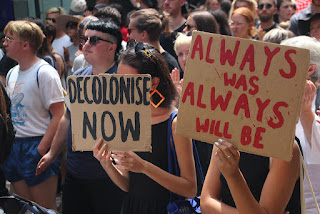
The majority of Australia voted “no” in a national referendum to add clauses to recognise Aboriginal and Torres Strait Islander people as the First People(s) in Australia, and to create an advisory board to the parliament and executive government made up of Aboriginal and Torres Strait Islanders.
The outcome of this historic referendum exhibits the undercurrent of racism and the colonial mindset that continues to exist in modern-day Australia. Only recently has the country begun to talk about the widely-denied brutal history of oppression against Aboriginal and Torres Strait Islander people, who were forcibly removed from their land through approximately 270 mass killings that persisted over 140 years until the late 1920s.
Furthermore, this was in conjunction with unjustified incarceration, the restriction of their movements and the forced removal of their children. These practices were carried out in a state-approved campaign that aimed to eliminate Aboriginal and Torres Strait Islander people. The effects of these practices and the discrimination that continues to occur are visible in many different metrics; including in their life expectancy which is 10 to 17 years younger in comparison to other Australians, in their higher infant mortality rates and in their greater risk towards heart disease and other chronic diseases.
The referendum itself proposed to add clauses in the constitution recognising Aboriginal and Torres Strait Islanders’ role in the country’s formation and to form an advocacy committee in parliament called the ‘Voice to Parliament’ that would further educate the public on their history.
Those in favour of the referendum say that acknowledging Aboriginal and Torres Strait Islander people as the indigenous peoples in the constitution, as well as giving them an assigned role in government, is a step towards reconciling the damage that has been done towards them.
The 60% that voted “no”, claimed that the referendum would be divisive and offer preferential treatment to certain groups over others, adding that having an advisory board for one minority group would set the precedent for other groups to want to do so. This comes despite having New Zealand as an example of how such an arrangement would work considering they have ensured the representation of their indigenous Māori peoples through designated seats in parliament since 1867.
This comparison reflects the colonial mindset and denial that persists in Australia, and the outcome of this referendum fails to address the fact that indigenous people, especially those who have experienced the extreme brutality that the Aboriginal and Torres Strait Islanders have, have a certain historical entitlement that other countries are able to recognise.
The outcome of this referendum misses the entire point of the changes that are trying to be made, changes that were meant to put Aboriginal and Torres Strait Islanders’ interests in their own hands, as opposed to historically having decisions made for them by the Anglo-Australian majority. In addition to rejecting the acknowledgement of Aboriginal and Torres Strait Islanders in the constitution – one that was built upon their massacre and displacement – is an echo of the racism and colonial legacy that exists in modern-day Australia.
Image: Invasion Day March Melbourne 2018 by John Englart, 2018//CC BY-SA 2.0



An excellent piece of work with an in-depth perspective and analysis